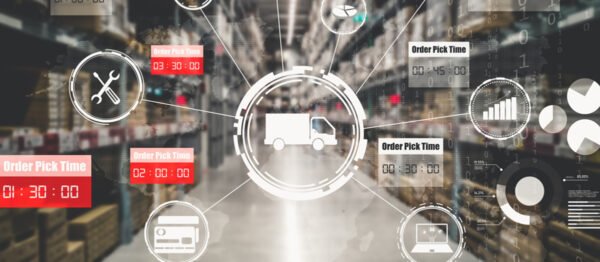
Revolutionising Logistics: The Role of Transport Management Systems in Supply Chain Optimisation
In the bustling world of business, having a seamless logistics operation is more than just an advantage; it’s a necessity. As businesses globally aim for faster and more economical delivery methods, the spotlight has turned to Transport Management Systems (TMS).

What Exactly is a Transport Management System?
Imagine a tool so robust that it can oversee the entirety of a product’s journey from warehouse to customer. That’s what TMS does. Picture this as your logistics command centre, managing everything from route planning and shipment consolidation to freight auditing and payment processing.
The Compelling Advantages of TMS

Slashing Costs Dramatically
Who doesn’t want to save money? TMS shines here by optimizing delivery routes and consolidating shipments, which can significantly cut down fuel expenses and reduce redundant trips. It’s all about delivering more for less!
Gaining Real-Time Insights
With TMS, businesses gain a bird’s-eye view of their transportation network. This system doesn’t just track vehicles; it provides a stream of real-time data and analytics that helps companies make informed decisions swiftly.
Boosting Customer Satisfaction
Quick and reliable delivery is music to any customer’s ears. TMS ensures that businesses can meet delivery timelines consistently, which is crucial for maintaining customer trust and satisfaction.
Ensuring Compliance
Navigating through regulatory landscapes can be tricky. TMS comes to the rescue by helping businesses adhere to transport laws and regulations, thus avoiding potential fines and legal issues.
TMS at Work: Streamlining Supply Chain Operations

Let’s break down how TMS makes logistics look easy:
- Route Optimization: TMS analyzes numerous variables like traffic patterns and weather conditions to chart the most efficient routes.
- Carrier Management: It compares different international freight transportation carriers to find the best rates and service, ensuring cost-effectiveness and reliability.
- Load Optimization: TMS makes sure every inch of truck space is used efficiently, which means cost savings and less risk of damage.
- Advanced Reporting: With detailed analytics, businesses can monitor their logistics performance and even predict future trends to stay ahead of the curve.
Implementing TMS: A Step-by-Step Guide
Thinking of integrating TMS into your operations? Here’s how to ensure a smooth implementation:
- Evaluate Your Needs: Start by identifying the specific logistics challenges you want to tackle.
- Select Suitable Software: Choose a TMS that aligns with your business size and budget.
- Train Your Team: Make sure your staff is well-versed in using the TMS effectively.
- Integrate Seamlessly: Ensure the TMS works well with other systems like ERP or WMS.
- Keep Improving: Continuously assess the TMS performance and make necessary adjustments.
Making It Personal: How TMS Tailors Logistics to Your Business Needs
Every business is unique, and so are its logistics needs. One of the standout qualities of a modern Transport Management System is its ability to be highly customizable. This means no matter the size of your business or the complexity of your supply chain, TMS can be tailored to fit like a glove. Here’s how TMS can be personalized to enhance your specific logistics operations:
Customizable Features for Every Business Model
Whether you’re running a multinational corporation or a small local business, TMS software can scale and adapt. It includes customizable modules that cater to different aspects of logistics:
Small Businesses: TMS can simplify operations with automated billing and straightforward route planning, removing the need for extensive logistics teams.
Large Enterprises: More complex features like integrated global trade compliance, multi-modal transportation management, and detailed analytics can help large businesses manage their extensive logistics networks effectively.
Industry-Specific Adaptations
TMS isn’t one-size-fits-all; it’s versatile enough to serve various industries with specific requirements:
- Retail: For the fast-paced retail industry, TMS can manage high-volume delivery schedules and handle returns efficiently.
- Manufacturing: It can synchronize with production schedules to ensure that shipments align with production runs, avoiding any downtime.
- Healthcare: TMS ensures timely delivery of sensitive goods like pharmaceuticals with compliance to stringent regulations.
User-Friendly Interfaces
Modern TMS solutions focus heavily on user experience, offering intuitive interfaces that make logistics management less of a chore and more of a pleasant part of your daily business operations.
Peering into the Future
Here are some trends shaping the future of transport management:
- Greater Automation: TMS is heading towards more automation, making complex decisions faster and with less human input.
- IoT Integration: With IoT, TMS can track real-time conditions more accurately, making logistics operations more dynamic.
- Machine Learning Enhancements: Machine learning algorithms can help predict logistics disruptions and optimize operations in real-time.
- Focus on Sustainability: Future TMS will likely include features that help reduce carbon footprints and promote green logistics.
- Blockchain Integration: Blockchain technology promises to make logistics processes more secure and transparent.
Wrapping Up
Incorporating a Transport Management System could be a game-changer for your business. In an era defined by efficiency, having a top-tier TMS could very well set your business on the path to success.














































